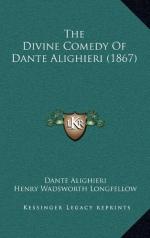|
This section contains 6,080 words (approx. 21 pages at 300 words per page) |

|
SOURCE: "Comedy and Modernity: Dante's Hell," in Modern Language Notes, Vol. CII, No. 5, December, 1987, pp. 1043-58.
In his essay, Harrison demonstrates that Guido's monologue in Inferno XXVII expresses Dante's comic world-view, in which earthly life is viewed as Hell.
For years I have wondered what T. S. Eliot had in mind when he began "The Love Song of J. Alfred Prufrock" with two tercets from the speech of Guido da Montefeltro in Inferno XXVII. How much did he know, or how much did he intuit, about the unique status of that canto in the Divine Comedy and its appropriateness as a frame for the dramatic monologue? Even if the young poet actually intended his Prufrock poem to become the modernist manifesto that it now represents for us, did he know, and did he expect his reader to realize, that from the perspective of a rigorous theology of history...
|
This section contains 6,080 words (approx. 21 pages at 300 words per page) |

|


